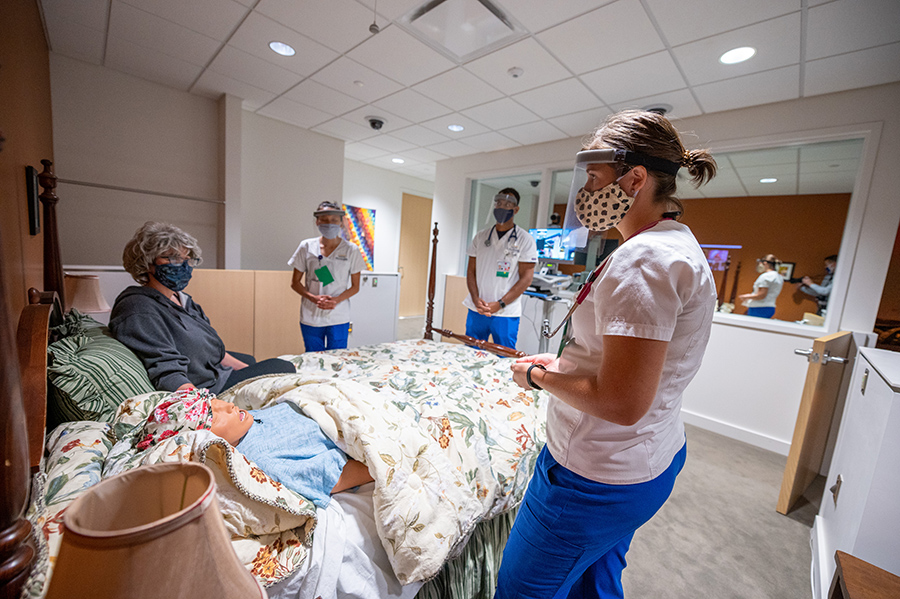Improving partnerships between family caregivers and health care professionals

Family Caregiving Institute hosts international virtual conference
The Family Caregiving Institute at the Betty Irene Moore School of Nursing at UC Davis hosted the Innovations in Workforce Education for Family Caregiving, a virtual summit in fall 2020.
Conference sessions focused on education that prepares health care providers to incorporate caregivers as team members. Conference sessions focused on education that prepares health care providers to incorporate caregivers as team members. The summit supports the institute’s goal to better prepare health professionals to partner effectively with family caregivers.
“We know that family caregivers provide over 80% of long-term care to frail, older adults and yet they remain largely invisible in the health care system,” said Terri Harvath, institute director at the time of the summit. “One of our goals is to augment the capacity of health care professionals to deliver person- and family-centered care by partnering effectively with family caregivers.”
Harvath relayed her own experience caring for a family member hospitalized for complications related to cancer. This was back in March. When the coronavirus pandemic bloomed, Harvath was evicted from the out-of-state hospital. She, like many others, was considered a visitor and nonessential.
“Family caregivers occupy a unique space where, because they are not the patient, they can be overlooked as health care professionals target their assessments and interventions for older adults,” Harvath said. “So, we brought together a multidisciplinary group of researchers, funders and experts in the family caregiving service sector to help us explore ways that we can better train both the incumbent workforce and health professions students to see, recognize and care for family caregivers, not just during hospitalizations, but across the care continuum.”
Through poster and panel presentations, the summit featured workshops, online modules, seminars, continuing education courses as well as graduate and undergraduate courses that target health professional education. Attendees learned about innovative programs for future health professionals to identify caregivers’ preparedness to provide care, as well as training in family-centered communication for the incumbent workforce. On the second day of the conference, participants broke out into smaller, world-café style discussion rooms to provide more personal input on what was shared from presenters.
“Health care providers need to learn ways to optimize caregivers in their role as team members and caregivers need be empowered to fully participate,” said Joan Weiss, a senior adviser at the Health Resources and Services Administration (HRSA) and keynote speaker. “In this time of COVID-19, caregivers now must develop the skills to become tech savvy to access telehealth technologies and Wi-Fi to be able to cross the increasing digital divide and provide the highest quality of care.”
As for this gathering, the focus was on ways to educate the workforce in terms of family caregiving. School of Nursing faculty shared their success in developing a Family Caregiving Graduate Academic Unit Certificate that piloted in fall 2019 and recently received approval by the by the UC Davis Graduate Council.
The purpose of the certificate program is to educate health care professionals to conduct comprehensive assessment and integrate family caregivers into the health care team to ensure family caregivers are supported and prepared to fulfill their role over the caregiving trajectory. By providing students with the knowledge and application of best practices in the research, leadership and clinical environments students will be able to effect change and lead the paradigm shift from person centered care to family centered care.
“We combined real family experiences within many cultures with our own clinical experience to present real-world scenarios. The students then had to co-create care plans by employing assessment strategies, shared decision making, evidence-based interventions and values assessments,” said Kathryn Sexson, lead educator for the institute. “At the conclusion, we asked students about how they believed the series impacted their practice and the lives of family caregivers. They told us it broadened their perspectives and even aided their own caregiving experiences during the current pandemic.”
After the successful pilot for graduate students, the School of Nursing intends to convert the content into accessible education for working professionals, including modular content that can be offered as continuing education units. Nursing administrators are also collecting data and analyzing educational outcomes in hopes to determine the impact of this type of education on patient and family caregiving outcomes.
Following the summit, organizers developed a report to leverage conversations and commitments with key organizations in order to encourage the adoption and development of broader educational initiatives that promote effective partnerships with family caregivers for older people.

